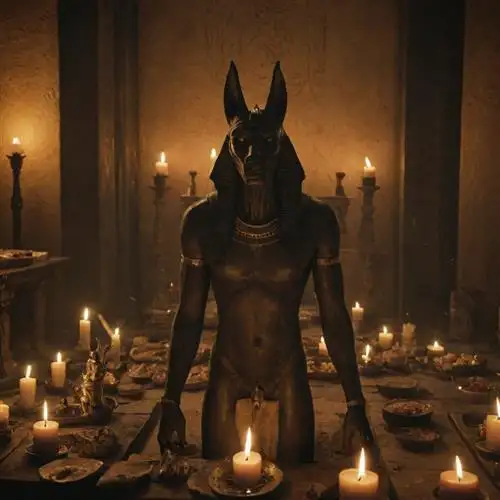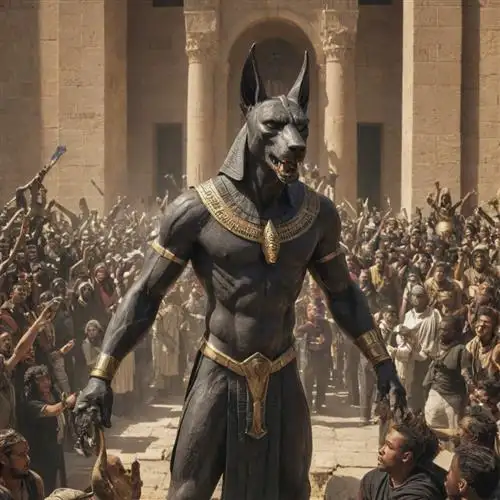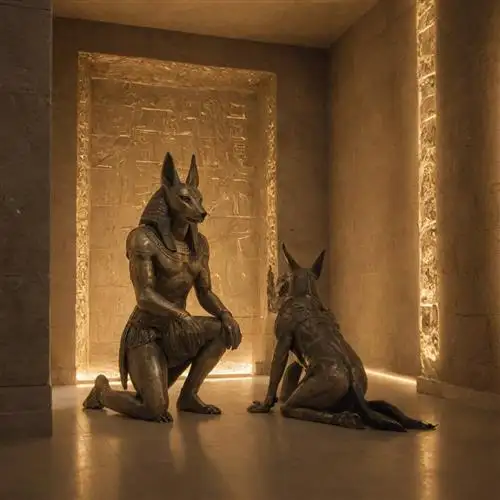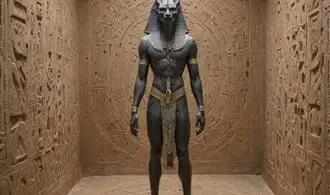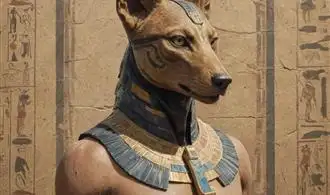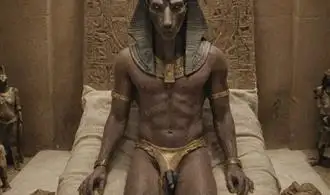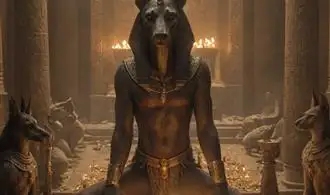
Anubis Rituals in Modern Spiritual Practices
Anubis, the ancient Egyptian jackal-headed god, has long been revered for his role in the afterlife and funerary rites. In recent decades, his influence has extended beyond the confines of ancient Egypt, with modern spiritual practitioners incorporating Anubis-focused rituals into their practices. These rituals, while controversial in some circles, offer a unique and profound connection to the mysteries of death, transformation, and the immortal soul.
One of the primary ways Anubis is honored in modern spiritual practices is through the use of ritual tools and symbols. This can include the wearing of Anubis-inspired jewelry, the creation of altars or shrines dedicated to the deity, and the incorporation of Anubis imagery into meditative and ceremonial work. Many practitioners also engage in chanting, visualization, and invocation exercises aimed at connecting with the energy and wisdom of Anubis.
A significant aspect of Anubis rituals in modern spirituality involves the exploration of death and the afterlife. Practitioners may use Anubis-centered practices to confront their own mortality, to honor the memory of loved ones who have passed, or to seek guidance and protection during the transition from life to death. These rituals can take many forms, from elaborate funerary rites to simple meditation and journaling exercises.
Another area of Anubis-focused ritual work in modern spirituality is the pursuit of personal transformation and rebirth. Anubis is often associated with the process of dying to old aspects of the self and being reborn into a higher, more authentic state of being. Practitioners may use Anubis rituals to facilitate the release of limiting beliefs, the integration of shadow aspects, and the emergence of a more empowered, self-actualized individual.
It's important to note that the inclusion of Anubis in modern spiritual practices is not without controversy. Some individuals and groups view the adoption of ancient Egyptian deities and practices as a form of cultural appropriation, while others express concerns about the ethical and practical implications of working with deities from traditions outside one's own cultural heritage. As with any spiritual practice, it is essential for practitioners to approach Anubis rituals with sensitivity, respect, and a commitment to ethical and responsible engagement.
Controversies and Misconceptions Around Anubis Rituals
The rituals and practices associated with the ancient Egyptian god Anubis have long been shrouded in mystery and controversy. Many modern interpretations and representations of Anubis rituals are often oversimplified or inaccurate, failing to capture the depth and nuance of these sacred rites. In reality, the rituals dedicated to Anubis were complex, multi-faceted, and deeply rooted in the ancient Egyptian worldview and spiritual beliefs.
One of the primary controversies surrounding Anubis rituals is the common misconception that they were solely focused on death and the afterlife. While Anubis was indeed the god of mummification and the protector of the dead, his rituals encompassed far more than just funerary practices. Anubis was also associated with the processes of transformation, rebirth, and the journey of the soul. Many Anubis rituals were designed to facilitate the deceased's transition to the afterlife, ensuring a successful and harmonious journey through the underworld.
Another area of controversy involves the perceived "dark" or "sinister" nature of Anubis rituals. This perception often stems from a lack of understanding of the ancient Egyptian worldview and the role of the divine in their spiritual practices. Anubis was not viewed as a "dark" or "evil" deity, but rather as a powerful and essential figure in the complex tapestry of Egyptian mythology and religion. His rituals were not intended to invoke darkness or harm, but rather to maintain balance, order, and the sanctity of the afterlife.
It is also important to note that the specifics of Anubis rituals were closely guarded and often restricted to a select group of priests and initiates. The details of these rituals were not widely disseminated, which has contributed to the proliferation of myths and misconceptions. However, through the study of ancient Egyptian texts, artifacts, and archaeological evidence, scholars have been able to piece together a more comprehensive understanding of the true nature and purpose of Anubis rituals.
The Symbolic Significance of Anubis in Rituals
Anubis, the ancient Egyptian god of the dead, holds a profound and multifaceted symbolic significance within the context of rituals. As the god responsible for the embalming and mummification of the deceased, Anubis played a crucial role in the journey of the soul from the physical world to the afterlife. This pivotal position in the Egyptian funerary customs imbued Anubis with a deep symbolic meaning that transcended his mere physical representation.
One of the primary symbolic associations of Anubis is his role as the gatekeeper between the realms of the living and the dead. In this capacity, Anubis was believed to guide the souls of the deceased through the perilous journey to the afterlife, ensuring their safe passage and protecting them from the dangers that may have lurked in the unseen world. This symbolic function was often manifested in rituals where Anubis was invoked to aid in the transition of the deceased, providing them with the necessary protection and guidance to navigate the complexities of the afterlife.
Another significant symbolic aspect of Anubis was his association with the process of mummification and embalming. As the god who oversaw the preservation of the physical body, Anubis represented the importance of maintaining the integrity of the corporeal form, which was believed to be essential for the soul's successful journey to the afterlife. Rituals involving Anubis often centered around the careful and meticulous preparation of the deceased, with the god's presence serving as a symbolic guarantee of the soul's continued existence in the next life.
Additionally, Anubis' symbolic significance extended to the concept of judgment and the weighing of the soul. In the Egyptian belief system, the deceased would undergo a judgment process where their heart would be weighed against the feather of truth. Anubis, as the god of the dead, was believed to preside over this critical moment, ensuring the accuracy and fairness of the process. Rituals associated with this aspect of Anubis often involved invocations and prayers, seeking the god's protection and guidance during the soul's judgment.
Anubis Rituals and the Afterlife
The ancient Egyptian deity Anubis played a pivotal role in the rituals and beliefs surrounding the afterlife. As the jackal-headed god associated with mummification, embalming, and the protection of the dead, Anubis was deeply intertwined with the funerary practices and the journey of the soul into the afterlife.
One of the most significant Anubis rituals was the "Opening of the Mouth" ceremony, which was performed during the mummification process. This elaborate ritual was believed to restore the deceased's senses and allow them to breathe, speak, and partake in the offerings in the afterlife. The ceremony involved the use of specialized tools, recitations, and the symbolic touching of the mummy's mouth, eyes, and nose, ensuring the deceased's ability to experience the afterlife fully.
Another crucial Anubis ritual was the weighing of the heart ceremony, known as the "Judgment of the Dead." This ritual took place in the afterlife, where the deceased's heart was weighed against the feather of Ma'at, the goddess of truth and justice. If the heart was found to be balanced and free of sin, the individual was granted passage to the afterworld. Anubis was responsible for overseeing this critical judgment, ensuring the deceased's soul was worthy of eternal life.
In addition to these central rituals, Anubis was also invoked in various funerary and mortuary practices. Statues and amulets of Anubis were often placed in tombs and on mummies to provide protection, guidance, and assistance to the deceased on their journey to the afterlife. The god's presence was believed to ensure a safe passage and a successful transition into the next world.

